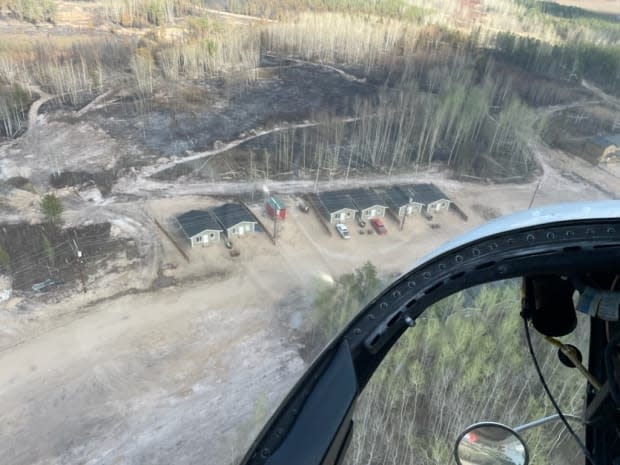Wildfire continues to threaten communities of the Buffalo River Dene Nation

A wildfire that continues to burn in Saskatchewan's northwest has destroyed at least eight cabins on the ancestral lands of the Buffalo River Dene Nation.
Rose and Dan Matzner, owned their cabin at Dillon Lake, about 550 kilometres northwest of Saskatoon, for 25 years.
It burned to the ground last Saturday.
"I felt like crying because you go there, you have so much in that place," Dan Matzner said in an interview from the couple's home in Meadow Lake on Friday night.
"It's a place where we did gathering of berries, medicine, got some trapping around there, hunting ... We took our grandkids out there, so that's all lost."

The same wildfire that reduced the cabin to ashes is still threatening Dillon, the main community of the Buffalo River Dene Nation.
The blaze, just southeast of Dillon, covered about 9,690 hectares on Saturday morning. It's grown by more than 2,000 hectares since Friday, according to the latest update from Saskatchewan's Public Safety Agency.
The wildfire prompted the evacuation of nearly 150 people from the Buffalo River Dene Nation earlier this week.
Those with chronic illnesses as well as the very young and the very old were transported to Lloydminster on Wednesday and are expected to stay there over the weekend.
Indigenous Services Canada and Meadow Lake Tribal Council assisted in the evacuation.
Approximately 600 people remain in the area near the fire. They are prepared to evacuate if necessary, according to Buffalo River Dene Nation Chief Norma Catarat.
There's a lot of smoke, which threatens access to the community's main road.
Catarat has two buses on standby in the community of Buffalo, located an hour away, in case more people need to be evacuated.
"It's going to be 35 C starting Sunday, that's a major concern too because once the heat is there, the potential for the fire to pick up is very high," she said.
Fresh air shelters have been set up at the nation's community hall, arena and gym in order to assist those struggling with the smoke.
Mental health teams have been deployed and Catarat is worried about how the fire will effect people in the area.
"That is a great loss for the community. Everybody's feeling it," she said.
Early start to wildfire season
High temperatures and strong winds have fuelled an early start to the wildfire season in Northern Saskatchewan.
Last week saw residents of La Loche, Salteaux First Nation and Clearwater River Dene Nation evacuate to Prince Albert, Lloydminister and Regina before they were allowed return as the wildfires were contained.
Georgina Jolibois, the mayor of La Loche, said no homes or structures were impacted by the fire, thanks to emergency crews.
"Many people did the right thing and assisted each other because the fire was literally at the doorsteps in two neighbourhoods," she told CBC.

Many of the people and resources who fought the fire in the La Loche area have returned home or been redeployed to battle the blaze near Dillon.
Dan and Rose Matzner believe their cabin was left to burn as all available manpower was put toward dealing with the widlfire near La Loche.
"There's nothing out there," Dan Matzner said. "Nothing. Every tree is burnt and the ground is — there's nothing left there. It's unbelievable the damage a fire can do, not only burn the house down, but it takes the whole environment."
Rose Matzner agreed.
"It's a great loss to us and that whole area," she said.
The couple estimate they will need to spend between $15,000 to $20,000 to rebuild the cabin, which was not insured due to the remote nature of the building. That figure doesn't include the contents or the emotional investment they made.
But the couple said they are committed to rebuilding it.
"It won't be soon, but it'll get done," Rose Matzner said.


